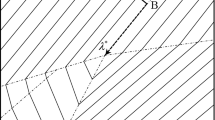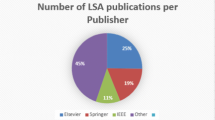Abstract
This paper presents the Local Search with SubProblem Exact Resolution (LSSPER) method based on large neighbourhood search for solving the resource-constrained project scheduling problem (RCPSP). At each step of the method, a subpart of the current solution is fixed while the other part defines a subproblem solved externally by a heuristic or an exact solution approach (using either constraint programming techniques or mathematical programming techniques). Hence, the method can be seen as a hybrid scheme. The key point of the method deals with the choice of the subproblem to be optimized. In this paper, we investigate the application of the method to the RCPSP. Several strategies for generating the subproblem are proposed. In order to evaluate these strategies, and, also, to compare the whole method with current state-of-the-art heuristics, extensive numerical experiments have been performed. The proposed method appears to be very efficient.
Similar content being viewed by others
References
Adams, J., Balas, E., and Zawack, D. (1988). “ The Shifting Bottleneck Procedure for Job Shop Scheduling.” Management Science 34, 391-401.
Ahuja, R.K., Ergun, O., Orlin, J.B., and Punnen, A.P. (2002). “A Survey of Very Large-Scale Neighborhood Search Techniques.” Discrete Applied Mathematics 123(1-3), 75-102.
Alvarez-Valdés, R. and Tamarit, J.M. (1989). “Heuristic Algorithms for Resource-Constrained Project Scheduling: A Review and an Empirical Analysis.” In R. Slowiński and J. Weglarz (eds.), Advances in Projet Scheduling. Amsterdam: Elsevier, pp. 113-134.
Applegate, D. and Cook, B. (1991). “A Computational Study of the Job Shop Scheduling Problem.” ORSA Journal of Computing 3(2), 149-156.
Artigues, C., Michelon, P., and Reusser, S. (2003). “Insertion Techniques for Static and Dynamic Resource-Constrained Project Scheduling.” European Journal of Operational Research 149(2), 249-267.
Baar, T., Brucker, P., and Knust, S. (1998). “Tabu-Search Algorithms and Lower Bounds for the Resource-Constrained Project Scheduling Problem.” In S. Voss, S. Martello, I. Osman, and C. Roucairol (eds.), Metaheuristics: Advances and Trends in Local Search Paradigms for Optimization. Kluwer, pp. 1-18.
Balas, E., Lancia, G., Serafini, P., and Vazacopoulos, A. (1998). “Job Shop Scheduling with Deadlines.” Journal of Combinatorial Optimization 1(4), 329-353.
Baptiste, P. and Le Pape, C. (2000). “Constraint Propagation and Decomposition Techniques for Highly Disjunctive and Highly Cumulative Project Scheduling Problems.” Constraints 5, 119-139.
Baptiste, P., Le Pape, C., and Nuijten, W. (1995). “Constraint-Based Optimization and Approximation for Job-Shop Scheduling.” In AAAI-SIGMAN Workshop on Intelligent Manufacturing Systems, Montreal.
Bell, C.E. and Han, J. (1991). “A New Heuristic SolutionMethod in Resource-Constrained Project Scheduling.” Naval Research Logistics 38, 315-331.
Bent, R. and Van Hentenryck, P. (2001). "A Two-Stage Hybrid Local Search for the Vehicle Routing Problem with Time Windows.” Technical Report CS-01-06, Brown University.
Bouleimen, K. and Lecocq, H. (2003). “A New Efficient Simulated Annealing Algorithm for the Resource-Constrained Project Scheduling Problem.” European Journal of Operational Research 149(2), 249-267.
Brucker, P., Drexl, A., Möring, R., Neumann, K., and Pesch, E. (1999). “Resource-Constrained Project Scheduling: Notation, Classification, Models, and Methods.” European Journal of Operational Research 112, 3-41.
Caseau, Y. and Laburthe, F. (1999). “Effective Forget-and-Extend Heuristics for Scheduling Problems.” In CP-AI-OR'99, Workshop on Integration of AI and OR Techniques in Constraint Programming for Combinatorial Optimization Problems, Ferrara, Italy.
Cho, J.-H. and Kim, Y.-D. (1997). “A Simulated Annealing Algorithm for Resource Constrained Project Scheduling Problems.” Journal of the Operational Research Society 48, 735-744.
Congram, R., Potts, C., and Van de Velde, S. (2002). “An Iterated Dynasearch Algorithm for the Single-Machine Total Weighted Tardiness Scheduling Problem.” INFORMS Journal on Computing 14(1), 52- 67.
Frangioni, A., Necciari, E., and Scutellà, M.G. (2004). “A Multi-Exchange Neighborhood for Minimum Makespan Machine Scheduling Problems.” Journal of Combinatorial Optimization 8(2), 195-220.
Gendreau, M., Pesant, G., and Rousseau L.-M. (2002). “Using Constraint-Based Operators with Variable Neighborhood Search to Solve the Vehicle Routing Problem with TimeWindows.” Journal of Heuristics 8(1), 43-58.
Glover, F. and Laguna, M. (1997). Tabu Search. Kluwer Academic.
Hartmann, S. (1998). “A Competitive Genetic Algorithm for Resource-Constrained Project Scheduling.” Naval Research Logistics 45, 733-750.
Hartmann, S. (1998). “A Self-Adapting Genetic Algorithm for Project Scheduling Under Resource Constraints.” Naval Research Logistics 49, 433-448.
Hartmann, S. and Kolisch, R. (2000). “Experimental Evaluation of State-of-the-Art Heuristics for the Resource-Constrained Project Scheduling Problem.” European Journal of Operational Research 127(2), 297-316.
Klein, R. and Scholl, A. (1999). “Computing Lower Bound by Destructive Improvement: An Application to Resource-Constrained Project Scheduling.” European Journal of Operational Research 112, 322-346.
Kohlmorgen, U., Schmeck, H., and Haase, F. (1999). “Experiences with Fine-Grained Parallel Genetic Algorithms.” Annals of Operations Research 90, 203-219.
Kolisch, R. (1996). “Serial and Parallel Resource-Constrained Project Scheduling Methods Revisited: Theory and Computation.” European Journal of Operational Research 90, 320-333.
Kolisch, R., Sprecher, A., and Drexl, A. (1998). “Benchmark Instances for Project Scheduling Problems.” In J. Weglarz (ed.), Handbook on Recent Advances in Project Scheduling. Kluwer, pp. 197-212.
Kolisch, R. and Hartmann, S. (1999). “Heuristic Algorithms for the Resource-Constrained Project Scheduling Problem: Classification and Computational Analysis.” In J. Weglarz (ed.), Project Scheduling: Recent Models, Algorithms and Applications. Kluwer, pp. 147-178.
Kolisch, R. and Padman, R. (2001). “An Integrated Survey of Deterministic Project Scheduling.” Omega 29(3), 249-272.
Lee, J.-K. and Kim, Y.-D. (1996). “Search Heuristics for Resource-Constrained Project Scheduling.” Journal of the Operational Research Society 47, 678-689.
Leon, V. and Ramamoorthy, B. (1995). “Strength and Adaptability of Problem-Space Based Neighborhoods for Resource-Constrained Scheduling.” OR Spektrum 17, 173-182.
Li, K.Y. and Willis, R.J. (1992). “An Iterative Scheduling Technique for Resource-Constrained Project Scheduling.” European Journal of Operational Research 56, 370-379.
Mausser, H.E. and Lawrence, S.R. (1997). “Exploiting Block Structure to Improve Resource-Constrained Project Schedules.” In F. Glover, I. Osman, and J. Kelley (eds.), Metaheuristics 1995: State of the Art. Maryland: Kluwer.
Mautor, T. and Michelon, P. (1997). “Mimausa: A New Hybrid Method Combining Exact Solution and Local Search.” In MIC'97, 2nd Metaheuristics International Conference, Sophia Antipolis, France.
Mautor, T. and Michelon, P. (2001). "Mimausa: An Application of Referent Domain Optimization.” Technical Report, Laboratoire d'Informatique d'Avignon.
Merkle, D., Middendorf, M., and Schmeck, H. (2002). “Ant Colony Optimization for Resource-Constrained Project Scheduling.” IEEE Transactions on Evolutionary Computation 6(4), 333-346.
Naphade, K.S., Wu, S., and Storer, S.D. (1997). “Problem Space Search Algorithms for Resource-Constrained Project Scheduling.” Annals of Operations Research 70, 307-326.
Nonobe, K. and Ibaraki, T. (1999). "Formulation and Tabu Search Algorithm for the Resource-Constrained Projet Scheduling Problem (RCPSP).” Technical Report, Department of Applied Mathematis and Physics, Kyoto University, Japan.
Patterson, J. (1984). “A Comparison of Exact Approaches for Solving the Multiple Constrained Resource Project Scheduling Problem.” Management Science 30(7), 854-867.
Pinson, E., Prins, C., and Rullier, F. (1994). “Using Tabu Search for Solving the Resource-Constrained Project Scheduling Problem.” In International Workshop on Project Management and Scheduling, PMS'94, Louvain, Belgique, pp. 102-106.
Pritsker, A.A.B., Waters, L.J., and Wolfe, P.M. (1969). “Multiproject Scheduling with Limited Resources: A Zero-One Programming Approach.” Management Science 16, 93-107.
Sampson, S.E. and Weiss, E.N. (1993). “Local Search Techniques for the Generalized RCPSP.” Naval Research Logistic Quarterly 40, 665-675.
Schirmer, A. (2000). “Case-Based Reasoning and Improved Adaptive Search for Project Scheduling.” Naval Research Logistics 47, 201-222.
Schutten, J.M.J. (1998). “Practical Job Shop Scheduling.” Annals of Operations Research 83, 161-177.
Shaw, P. (1998). “Using Constraint Programming and Local Search Methods to Solve Vehicle Routing Problems.” In Principles and Practice of Constraint Programming CP-98, Pisa, Italy, Lecture Notes in Computer Science, Vol. 1520, pp. 417-431.
Sourd, F. (2001). “Scheduling Tasks on Unrelated Machines: Large Neighborhood Improvement Procedures.” Journal of Heuristics 7(6), 519-531.
Taillard, E. and Voss, S. (2002). “Popmusic - Partial Optimization Metaheuristic Under Special Intensification Conditions.” In C.C. Ribeiro and P. Hansen (eds.), Essays and Surveys in Metaheuristics. Boston: Kluwer, pp. 613-629.
Thomas, P.R. and Salhi, S. (1998). “A Tabu Search Approach for the Resource Constrained Project Scheduling Problem.” Journal of Heuristics 4, 123-139.
Valls, V., Ballestin, F., and Quintanilla, M.S. (2000). “Resource-Constraint Project Scheduling: A Critical Activity Reordering Heuristic.” In PMS'2000, 7th International Workshop on Project Management and Scheduling, Osnabruck, Germany, pp. 282-283.
Valls, V., Ballestin, F., and Quintanilla, M.S. (2002). “A Hybrid Genetic Algorithm for the RCPSP with the Peak Crossover Operator.” In Proc. of 8th International Workshop on Project Management and Scheduling, PMS 2002, Valencia, Spain, pp. 368-370.
Author information
Authors and Affiliations
Rights and permissions
About this article
Cite this article
Palpant, M., Artigues, C. & Michelon, P. LSSPER: Solving the Resource-Constrained Project Scheduling Problem with Large Neighbourhood Search. Ann Oper Res 131, 237–257 (2004). https://doi.org/10.1023/B:ANOR.0000039521.26237.62
Issue Date:
DOI: https://doi.org/10.1023/B:ANOR.0000039521.26237.62




